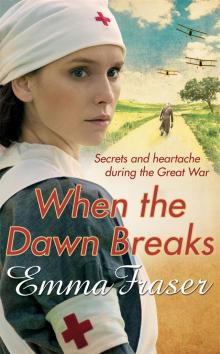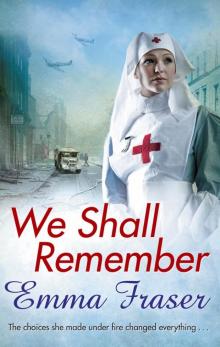- Home
- Emma Fraser
We Shall Remember
We Shall Remember Read online
Emma Fraser is an ex-nurse and she completed her training in Edinburgh. After writing several medical romances under the name Anne Fraser, her research into medical training in the early twentieth century inspired her to write about strong Scottish nurses and female doctors during World War I and her first novel as Emma Fraser, When the Dawn Breaks, was the result. When the Dawn Breaks was shortlisted for the Epic Romantic Novel RoNA Award in 2014. Emma lives with her husband and two children in Glasgow.
Also by Emma Fraser
When the Dawn Breaks
COPYRIGHT
Published by Sphere
978-1-4055-2291-5
All characters and events in this publication, other than those clearly in the public domain, are fictitious and any resemblance to real persons, living or dead, is purely coincidental.
Copyright © Emma Fraser 2014
The moral right of the author has been asserted.
All rights reserved. No part of this publication may be reproduced, stored in a retrieval system, or transmitted, in any form or by any means, without the prior permission in writing of the publisher.
The publisher is not responsible for websites (or their content) that are not owned by the publisher.
SPHERE
Little, Brown Book Group
Carmelite House
50 Victoria Embankment
London, EC4Y 0DZ
www.littlebrown.co.uk
www.hachette.co.uk
We Shall Remember
Table of Contents
About the Author
Also by Emma Fraser
COPYRIGHT
Dedication
Acknowledgements
Epigraph
Chapter 1: Warsaw, Poland
Chapter 2: Edinburgh, 1989
Chapter 3: Warsaw, 1939
Chapter 4
Chapter 5
Chapter 6: Edinburgh, 1989
Chapter 7: Warsaw, 1939
Chapter 8
Chapter 9
Chapter 10
Chapter 11: Edinburgh, 1989
Chapter 12
Chapter 13: Warsaw, 1940
Chapter 14
Chapter 15
Chapter 16: Rozwadow, Poland, 1940
Chapter 17: London, 1989
Chapter 18: Rozwadow, 1941
Chapter 19
Chapter 20
Chapter 21
Chapter 22
Chapter 23
Chapter 24
Chapter 25: London, 1989
Chapter 26: London, 1941
Chapter 27
Chapter 28: Edinburgh, 1989
Chapter 29
Chapter 30: Scotland, 1941
Chapter 31
Chapter 32
Chapter 33
Chapter 34: February 1942
Chapter 35
Chapter 36
Chapter 37
Chapter 38
Chapter 39
Chapter 40: Skye, 1943
Chapter 41: Edinburgh and Skye, 1989
Chapter 42: Scotland, 1943
Chapter 43
Chapter 44: Skye, 1989
Chapter 45: Poland, 1944
Chapter 46
Chapter 47
Chapter 48
Chapter 49: Skye, 1989
Chapter 50
Chapter 51
Chapter 52
Chapter 53
Chapter 54: December 1996
To Hanka Kościa and all those who, like her, risked or lost their lives during World War Two.
Acknowledgements
As always, I owe so many people thanks for their help with this book. Firstly my daughter Katherine for alerting me to the true story of Dr Eugene Lazowski and Dr Stanislaw Matulewicz, who created a fake typhus epidemic that saved many Poles from German labour and death camps. Reading about them inspired me to write this story.
Huge thanks also to my friend Karen and my daughter Rachel for accompanying me on my trips to Poland; to my sisters Flora and Mairi for your support and encouragement during the writing of this book and your valuable insights; to Dr Maria Graham for showing me the collection of memorabilia from the Polish hospital in Edinburgh; to Thalia Proctor, Manpreet Grewal and their team for their patience and insights; to my agent Judith Murdoch and to Hanka Kościa, who joined the Home Army as a cadet when she was sixteen and who shared her incredible story with me – you are amazing.
And last, but not least, to my husband Stewart for giving me the time and space to write this story – I know it’s not always easy living with a writer!
Books I found particularly helpful while writing this book and that readers might find interesting were: The Eagle Unbowed by Halik Kochanski, We Were Young and at War by Sarah Wallis and Svetlana Palmer, Station 43: Audley End House and SOE’s Polish Section by Ian Valentine and The Spy Who Loved: The secrets and lives of Christine Granville, Britain’s first agent of WWII by Clare Mulley. Any errors are, of course, mine.
When you go home tell them of us and say
for your tomorrow we gave our today
Attributed to John Maxwell Edmonds (1875 –1958)
They shall grow not old, as we that are left grow old:
Age shall not weary them, nor the years condemn.
At the going down of the sun and in the morning,
We will remember them.
From ‘For the Fallen’ by Laurence Binyon
Chapter 1
Warsaw, Poland
1 September 1939
Irena cowered under the chassis of the car, pressing her face into the road so hard it hurt. Bullets ripped into the metal only inches away from her, and as spurts of dirt from the side of the road bit into her skin, she covered her head with her hands and screamed.
The drone of the plane receded and she risked a look to her left. A man staggered to his feet, his arm hanging limply by his side, and took a few uncertain steps towards her before falling to his knees. He reached out a bloody hand, his pleading eyes fixed on her.
She was about to scramble out from under the car to help him when she heard it: the whine of the returning plane.
Using his uninjured elbow to propel himself forward, the man inched towards her, in a desperate, floppy movement.
‘Hurry,’ she urged. She wasn’t sure if she’d spoken the words or merely thought them. If he could make it to the car he’d be safe – at least, as safe as she was. Under the car she ran the risk of death; out there in the open, it was almost a certainty.
Please. Help me, he mouthed. His eyes were wide pools of terror.
She wanted to, God, she wanted to, but she couldn’t make her body move.
The screeching of the plane grew louder, and as it descended, Irena could clearly make out the swastikas on the wings. It opened fire again; a staccato of bullets slashing the ground. The man jerked a few times and lay still.
Just when she thought the Luftwaffe pilot was going to make another sweep, a Polish plane dropped down from the clouds. Immediately the German turned his attention to his attacker, and within moments both planes had disappeared from the sky. Irena curled into a ball. Only a few hours ago she’d been sleeping, dreaming of Piotr. Now she was in the middle of a nightmare.
Her father was wrong. Everyone had been wrong. This wasn’t war. This was murder.
Yesterday, she and Magdalena, like so many other Varsovians, had been making the most of the last day of the summer holidays. It had been gloriously warm so they’d spent the morning in the park, sitting on a bench chatting, stopping now and again to watch the children as they played close to their mothers and nannies. As an elderly couple strolled past with their arms linked, Irena and Magdalena exchanged an envious look. Like most young Polish men, their fiancés had been with
their units for well over a month.
‘Just think! In a few months we will truly be sisters,’ Magdalena smiled. She was to marry Irena’s brother Aleksy at Christmas. She tucked her arm into Irena’s. ‘You and Piotr will be next.’
‘Not for another two years. Not until I have qualified.’
‘I couldn’t wait that long. I can hardly wait three months!’
‘Piotr and I have all the time in the world to be married,’ Irena replied. Even as she said the words she wondered if that were true. There had been talk of war with Germany for some time, and since the invasion of Czechoslovakia and the increasingly strident demands from Hitler for a corridor from the Reich to East Prussia, the prospect had seemed almost inevitable. But then Britain and France had signed a treaty and everyone had relaxed. Germany wouldn’t do anything now, they told each other, and if there was a war it would be short lived. With Britain and France on their side they’d teach Hitler a lesson he wouldn’t forget.
No one was truly concerned about the possibility of war. If anything, most people, especially the younger ones, were excited by it and there was almost a carnival air about the city. All the same, Irena couldn’t help but worry. With her brother in the air force and her fiancé in the army, it would be stupid not to.
‘When do you think we’ll see Aleksy and Piotr again?’ Magdalena asked.
‘Soon, I hope.’ Irena squeezed her friend’s hand, shaking away the feeling of unease. There was no point in worrying about something that might not happen. ‘Come on, Madzia, let’s find somewhere to eat. I’m ravenous and if we still want to go to the concert and make it home before dark we should get on.’ As she often did out of term time, Irena was spending the night at her friend’s home a few miles out of Warsaw.
But in the early hours of the morning, Irena was woken by the sound of rumbling. Assuming it was a summer storm, she’d thrown back her bed covers and gone to close the window she’d left open to allow some night coolness into the room. At first she thought the flashes in the sky were lightning, but then realisation dawned. This was no storm. It was the sound of cannon coming from the east.
She ran to wake Magdalena and they stood at the bedroom window, holding hands, listening to the dull thud of explosions and watching in stunned silence as the sky filled with planes.
‘Perhaps it’s a training exercise,’ Magdalena whispered.
Irena didn’t think so. ‘Come on, we should listen to the news.’
On the landing they met Magdalena’s mother, Elżbieta. The usually unruffled aristocrat looked pale and frightened. Her hair was coming loose from its plait and she was wearing a robe hastily pulled over her nightdress. ‘What’s happening?’
‘We’re going to find out,’ Irena replied. ‘There’s bound be an announcement on the radio.’
They hurried downstairs to the drawing room where Elżbieta switched on the wireless.
‘Poland is under attack. We are at war with Germany, but Polish forces will resist. Stay calm.’ The terse announcement was repeated and followed, a few minutes later, by the national anthem and Chopin’s Polonaise in A major. As they listened they were joined by the two maids and the cook, all in their nightclothes.
‘Dear God,’ Magdalena’s mother murmured, crossing herself. ‘I didn’t think they would really do it.’
As the strains of the Chopin’s Polonaise faded, the announcer came back on. ‘Danzig and Krakow are being bombarded. We urge residents to stay calm and wait for further announcements.’
‘Where’s Tata?’ Magdalena cried. ‘And Piotr and Aleksy!’
Magdalena’s father, Colonel Ĺaski, was Piotr’s commanding officer in the Uhlan and Aleksy, Irena’s brother and Magdalena’s fiance, was a pilot with the Polish Pursuit Brigade.
When Magdalena started to cry, Irena gathered her into her arms. ‘They’ll be all right, Madzia. You’ll see. Our army is strong. Besides, now that the Germans have attacked, the British and French will come to help us.’
Despite her words, Irena wasn’t sure. They would come, but would they come in time? And what about her father? Thank God he had come to meet with a colleague at the Warsaw medical school, otherwise he’d be in Krakow.
‘I must go,’ Irena said. ‘Knowing Tata, he’ll have gone straight to the hospital. I have to go there, too. It’s what he’ll expect me to do.’
Her friend raised her tear-stained face. ‘You can’t. It’s too dangerous. Stay here with us. Tell her, Mama.’
Irena drew away. ‘I have to go, Madzia.’
Magdalena clutched her arm. ‘Have you lost your mind? You can’t go out there. At least wait a while. Perhaps the Germans will leave us alone. Maybe they’re just making a point.’
Her friend had always been a dreamer. All her life she’d been protected from the harsher realities by parents who treated her as if she were too young to make decisions for herself. Irena loved her friend but sometimes Magdalena’s unwillingness to see what was in front of her nose exasperated her. ‘Anyway, you aren’t a doctor,’ Magdalena continued, ‘only a medical student. What can you do?’
‘I don’t know.’ Irena shrugged. ‘Something. Anything. I just have to be there.’
Elżbieta added her protests to her daughter’s. ‘It’s not safe. Your father would never forgive me if I let anything happen to you.’
‘Nothing will happen to me!’ Oddly, she wasn’t at all frightened. She wanted to be in the thick of things. Nothing this exciting had ever happened before. It might soon be over and she didn’t want to miss her chance to be part of it. Gently she removed Magdalena’s hand from her arm. ‘I won’t be a moment.’ She ran upstairs and into the guest room, pulled her dress on over her slip and started gathering together the rest of her belongings.
‘Don’t leave, Renia. Please.’ Irena turned to find that Magdalena had followed her upstairs. ‘I couldn’t bear it if anything happened to you.’
Irena gripped her friend by the elbows. ‘You mustn’t worry about me. Warsaw is the best defended of our cities. It’s probably safer there than here. You should come with me.’
‘Mama won’t leave, you know that.’
Irena lifted her valise. ‘If there’s any danger take shelter in the cellar and don’t come out until you’re sure it’s safe.’
By the time they went back downstairs, the anti-aircraft guns were in action and the sky had cleared.
‘Perhaps it is over,’ Magdalena said.
Irena thought it unlikely. Aleksy had told her that fighter planes had only enough fuel to remain in the sky for short periods. The German aircraft would have had further to travel and so would need to refuel sooner. No doubt after they refuelled they’d be back. If she were going to go, it had to be now.
Elżbieta tried again to stop her from leaving but when she saw that Irena was determined to have her way, she grasped her hand. ‘Take the car,’ she said. ‘It will be quicker than the train – supposing they’re still running.’ While Irena had been upstairs, Elżbieta had dressed and done her hair. She still looked less than her usual immaculate self, but she’d regained the bearing and courage befitting a Polish officer’s wife.
‘Won’t you need it?’ Irena asked.
‘You know neither Magdalena nor I can drive. And with no chauffeur…’ She frowned as if the inconvenience of being without a driver was more of an irritation than the war. ‘Besides, we won’t be going anywhere. Not until we hear from the colonel. He’ll let us know when it’s safe.’

 When the Dawn Breaks
When the Dawn Breaks Greyfriars House
Greyfriars House We Shall Remember
We Shall Remember The Shipbuilder’s Daughter
The Shipbuilder’s Daughter